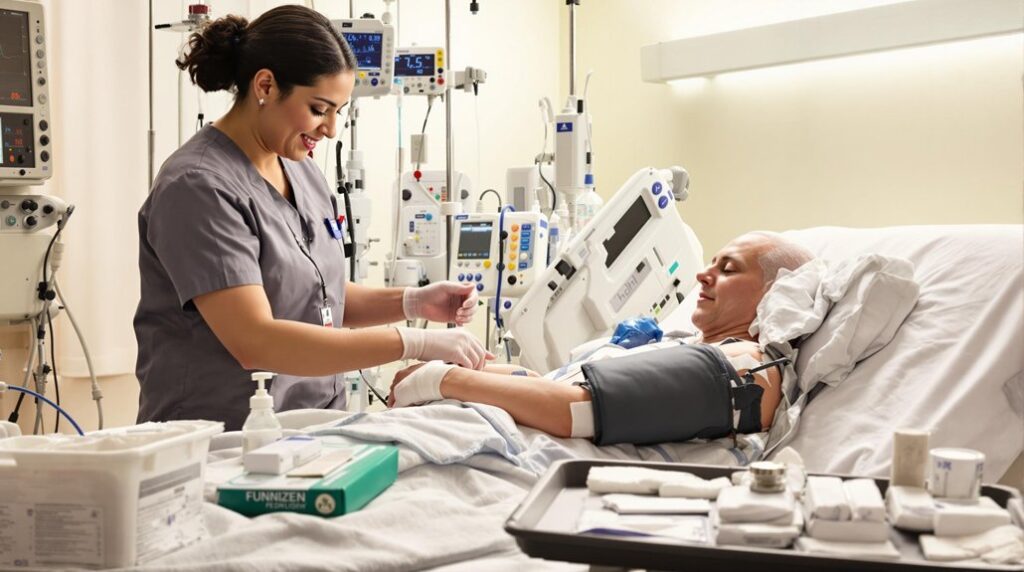Post-operative care requires you to focus on several key areas to guarantee proper healing. You’ll need to manage pain effectively with prescribed medications, keep your surgical wound clean and dry, and monitor crucial signs regularly. Don’t forget to follow specific guidelines for nutrition, hydration, and activity restrictions. You should also watch for warning signs of complications and maintain clear communication with your healthcare team. Understanding these essential elements will help guide your path to recovery.
Essential Elements of Pain Management
Effective pain management after surgery requires a systematic approach combining medication, monitoring, and patient communication.
You’ll need to assess your patient’s pain levels regularly using standardized pain scales and document their responses accurately. Consider opioid alternatives like NSAIDs or acetaminophen when appropriate to reduce dependency risks.
Incorporate non-pharmacological techniques into your pain management strategy. You can teach your patients breathing exercises, guided imagery, or proper positioning to help minimize discomfort.
Using cold or heat therapy, when indicated, can also provide significant relief. Remember to educate your patients about pain expectations and encourage them to report uncontrolled pain promptly.
Monitor for side effects of pain medications and adjust the treatment plan accordingly.
Your attentive care will help guarantee ideal recovery and patient comfort.
Personalized care plans from professional caregivers ensure comprehensive pain management and medication adherence around the clock.
Wound Care and Infection Prevention
Proper wound care directly impacts post-operative recovery and prevents complications.
You’ll need to monitor the surgical site carefully and perform dressing changes according to your healthcare provider’s instructions. Keep the wound clean and dry, using sterile technique when handling the area.
Watch for infection symptoms, including increased redness, warmth, swelling, or unusual drainage from the incision site. If you notice fever, increased pain, or foul odor, contact your healthcare provider immediately. These could indicate a developing infection that requires prompt attention.
You’ll need to educate your patient about proper hygiene practices, including hand washing before and after wound care.
Make certain they understand the importance of taking prescribed antibiotics as directed and following activity restrictions to protect the healing wound.
Recovery typically involves 4 to 6 weeks of dedicated post-operative care for optimal healing outcomes.
Vital Signs Monitoring and Assessment
Beyond wound observation, regular monitoring of crucial signs provides key indicators of post-operative recovery progress. You’ll need to check temperature, blood pressure, heart rate, and respiratory rate at prescribed intervals.
Understanding essential sign thresholds helps you identify potential complications early.
To perform accurate assessment techniques, you’ll want to use calibrated equipment and maintain consistency in your measurement methods. Take temperature readings from the same site, measure blood pressure with appropriate cuff sizes, and count full respiratory cycles for a complete minute.
Document your findings promptly and notify healthcare providers if readings fall outside established parameters.
Your attention to detail in crucial signs monitoring can make a significant difference in patient outcomes, as early detection of abnormal trends allows for timely intervention and improved recovery.
Working with skilled nursing care ensures expert monitoring of vital signs and reduces the risk of post-surgical complications.
Medication Administration and Safety
While post-operative recovery involves many aspects of care, safe medication administration remains a cornerstone of successful healing.
Proper medication management serves as the foundation for effective post-surgical recovery and optimal patient outcomes.
You’ll need to maintain strict medication safety protocols and guarantee dosage accuracy to prevent complications during your patient’s recovery period.
When administering medications, remember these essential points:
- Always verify the “five rights” of medication administration: right patient, right drug, right dose, right route, and right time
- Double-check medication labels and dosage calculations, especially for high-risk medications like anticoagulants and narcotics
- Document all medications immediately after administration, including the patient’s response and any side effects
You’ll be responsible for monitoring your patient’s pain levels and adjusting medications as prescribed, while staying alert for potential drug interactions or adverse reactions that could impact their recovery.
Perioperative care services ensure proper medication management and pain control throughout the surgical journey, from pre-surgery preparation through post-operative recovery.
Mobility and Physical Recovery Guidelines
Safe medication management supports healing, but getting patients moving again is equally essential for recovery.
You’ll need to help patients gradually increase their activity levels while guaranteeing they don’t overexert themselves. Start with simple post operative exercises like deep breathing, ankle pumps, and gentle leg movements while they’re in bed.
As patients progress, assist them with sitting up, dangling their feet, and eventually standing. They may need mobility aids such as walkers or canes – guarantee these are properly fitted and that you’ve taught correct usage techniques.
Watch for signs of dizziness or pain during movement, and always follow the surgeon’s specific guidelines for activity restrictions.
Early mobility helps prevent complications like blood clots and pneumonia while promoting circulation and maintaining muscle strength.
Licensed physical therapists can develop customized treatment plans tailored to individual recovery needs post-surgery.
Nutrition and Hydration Requirements
After surgery, proper nutrition and hydration play essential roles in wound healing and recovery. You’ll need to focus on consuming nutrient-rich foods and maintaining adequate fluid intake to support your body’s healing process. Your healthcare provider may recommend specific nutritional supplements to boost your recovery.
- Start with clear liquids and gradually progress to soft foods as tolerated, following your doctor’s guidance on when to advance your diet.
- Implement hydration strategies like drinking small amounts frequently throughout the day, aiming for pale yellow urine.
- Choose protein-rich foods such as lean meats, eggs, and legumes to support tissue repair and wound healing.
Remember to track your food and fluid intake, and don’t hesitate to ask your healthcare team if you’re struggling with nutrition or hydration during your recovery period.
Emotional Support and Mental Well-being
Going through surgery can take a significant emotional toll on your mental well-being. You’ll need to build emotional resilience through proper support and understanding of your recovery journey. Engage with support networks, including family, friends, and healthcare providers who can offer comfort and encouragement during challenging moments.
| Support Type | Benefits | Actions |
|---|---|---|
| Family/Friends | Comfort & Care | Daily Check-ins |
| Healthcare Team | Professional Guidance | Regular Updates |
| Support Groups | Shared Experiences | Join Communities |
Remember to communicate openly about your feelings and concerns with your care team. Don’t hesitate to ask for professional mental health support if you’re experiencing anxiety or depression. Taking care of your emotional well-being is just as essential as physical recovery, and it’s perfectly normal to seek help when you need it.
Home Care Instructions and Follow-up
When returning home from surgery, you’ll need to follow specific care instructions to guarantee proper healing and prevent complications.
Patient education ensures you understand how to maintain a safe home environment and recognize warning signs that require medical attention.
Your healthcare provider will give you detailed instructions for:
- Wound care, including how to change dressings, monitor for infection, and maintain proper hygiene
- Medication schedules, dosages, and potential side effects to watch for
- Activity restrictions and when you can safely resume normal daily tasks
Schedule your follow-up appointments before leaving the hospital and keep a log of your recovery progress.
Don’t hesitate to contact your healthcare team if you have questions or concerns about your recovery.
Warning Signs and Emergency Response
Recognizing post-operative warning signs can mean the difference between a smooth recovery and serious complications.
When caring for a post-operative patient, you’ll need to watch for emergency symptoms that require immediate medical attention.
Contact medical help immediately if you notice: fever above 101°F, excessive bleeding or discharge, severe pain unrelieved by medication, difficulty breathing, chest pain, swelling or redness at the incision site, or signs of infection.
Post-surgical red flags requiring immediate medical attention: high fever, heavy bleeding, severe pain, breathing problems, chest pain, and infection symptoms.
Patient alerts should also include confusion, fainting, inability to urinate, or persistent nausea and vomiting.
Keep emergency contact numbers readily available, including the surgeon’s office and nearest emergency room.
Don’t hesitate to call if you’re unsure about symptoms – it’s better to be cautious than to risk the patient’s health and recovery.
Conclusion
Taking good care of yourself after surgery helps you heal better and faster. When patients follow their doctor’s instructions carefully, they’re much less likely to have problems during recovery. Just like tending to a garden, you need to watch over your healing body by keeping track of pain, keeping surgical areas clean, taking medications on time, and watching for any warning signs. Think of your body as working hard behind the scenes to heal – your job is to support that healing process.
You’re never alone on this recovery journey. It’s normal to have questions or concerns as you heal. Your healthcare team is like a support system of friends who want to see you get better. They’re ready to help you every step of the way.
Remember: Your health and comfort are top priorities. If something doesn’t feel right or you’re unsure about what to do, speaking up is the right choice.
If you or a loved one need help, don’t wait. Reach out to Focus Family Care today at (561) 693-1311 or email us at info@focusfamilycare.com.





